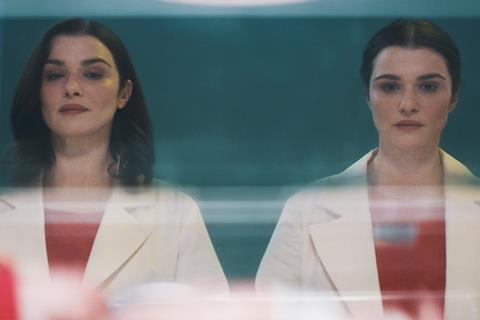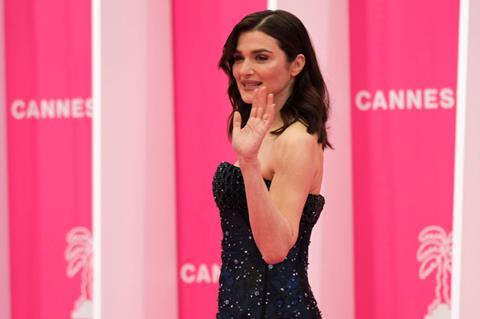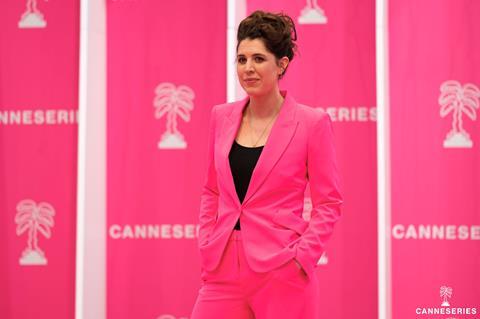
Prime Video’s new series Dead Ringers reimagines David Cronenberg’s 1988 twisted psychological thriller as a female-powered tale starring Rachel Weisz in a double role as the infamous Mantle twins.
Oscar-winner Weisz joined the series’ showrunner Alice Birch (Normal People, Lady Macbeth) and actress Britne Oldford (Skins, The Umbrella Academy) to world premiere the series at Canneseries ahead of its six-episode rollout on April 21. The series earned cheers from the audience inside Cannes’ Lumiere theatre in the Palais des Festivals during its opening scene and a standing ovation following its screening in Competition at the event.
The Oscar-winning Weisz plays twin gynecologists Elliot and Beverly Mantle, a gender-swapped take on Jeremy Irons’ original blood-spewing brothers, who perform ethically questionable procedures on women with fertility issues. Cronenberg’s film was inspired by the novel Twins by Bari Wood and Jack Geasland.
Weisz not only did double duty on screen, but the Oscar-winning actress also executive produced, and Birch did her own multi-tasking as creator, writer and executive producer. It is directed by Sean Durkin (The Iron Claw, The Nest).
Weisz and Birch sat with Screen at Canneseries to talk about the technical tricks involved in twin trading and infusing fun into the horror.
Let’s start at the beginning. Tell us about the birth of Dead Ringers, the series.

Rachel Weisz: I was a fan of the film, the original 1988 Cronenberg masterpiece, for many, many years. I was looking for stories that I could be in, stories with a female character or relationship at the centre of it, ie women in relation to other women. Sisters seemed like really interesting terrain for storytelling. And then it just came to me: ‘What if that story was retold and I played the twins and it was set now?’ I went to Sue Nagel at Annapurna and she also thought it was a good idea and she got the rights from Morgan Creek, which was a process. Then I asked Alice if she thought it was an interesting idea too.
Alice Birch: I hadn’t seen the Cronenberg film before so I watched it and then watched it again several times. It felt like it was going to be a huge challenge. As Rachel said, it’s such an iconic film and there are so many incredible things about it, but with the central relationship and the strange timing of the medical backdrop I felt that yes, in six hours, we could definitely have enough material for that.
Was the plan always for a series format?
Weisz: Always for television. From the beginning. The film is perfect and iconic and we wouldn’t be interested in trying to redo it in any way. We wanted to do something else. It was about finding a new form for it.
Birch: I don’t understand what the reason would be to make it as a film again. The film is amazing. So yes, the series gives us more time. And it gives us a chance to create a new set of characters and follow them on a different journey. TV has become increasingly novelistic.
Weisz: It’s a place that is led by the writer and the showrunner, it’s a unique space in the sense that the writer has creative control. It’s a new era.
The series, like the film, does explore body horror and it is still a deep, dark psychological thriller, but there is also a fun, often witty tone throughout. Was it intentional to make it a bit campy?
Weisz: Very much so. Even in the writers’ room, we talked about that a lot. Alice always noted about the film: “They’re having such a good time, the Irons brothers.” They have a martini glass in their hand, they go to a party. We really wanted to really sustain that fun …until things go wrong. They’re at the top of their game professionally, they’re living their best lives. It’s dysfunctional and bizarre but they’re having a great time. Alice wrote this tone of dark humour into the dialogue which is so brilliant.
Birch: It’s fun to write. When you’re dealing with very serious – the most serious – subjects, I don’t think you want to sit in that for too long. It doesn’t feel true to life. The twins were so helpful for that. Beverly is the more serious one. She’s slightly more earnest. Elliott is there to subvert it or poke at it. I think the humour came from the characters themselves.
This really does deal with some very deep and timely issues, particularly around women’s reproductive health. What were your discussions in the writer’s room around tackling such politically-charged topics?

Birch: I think we had decided early on that they were obstetricians [rather than gynecologists], which is different from the film. This was partly due to story - it meant we had access to a whole new kind of patient and central characters, but also that they, and particularly Beverly, had these huge ambitions to build a centre that will change how women birth. For Elliott, it’s much more about scientific discovery There’s less empathy or compassion – it’s purely driven by her own scientific excitement.
How did you film the dual role from a technical perspective?
Weisz: I had an acting partner called Kitty Hawthorne. She was still at drama school and she sent her audition tape and she is just a brilliant actress and a wonderful scene partner. As far as the technology goes, the effects producer Eric Pascarelli is a proper artist and an uber nerd, a truly gifted and genius artist.
Birch: The first kind of motion control was developed on the original Dead Ringers film. And actually somebody who worked on the motion control on Cronenberg’s Dead Ringers did the subtitle design for our TV show.
Weisz: If the twins were talking to each other in the same frame, we would usually begin with Elliott. She set the pace as she’s more of a leader. And then I would go into hair and make-up and costumes and change into Beverly, then come back. My scene partner Kitty would change as well. Alice and the director would choose a hero take from Elliot. So if there were 10 takes, while I was changing, they would choose a take. There were things that could later be changed in the edit, but we had to choose then so that Beverly is speaking in the right pauses.
How did you work together in terms of the writing process. Rachel, did you wear your producer hat throughout the production?
Weisz: We talked for months then Alice assembled the writers’ room.
Birch: Rachel joined the writers’ room as a storyteller. It was really wonderful to have her in the room along with the writers.
Weisz: There were seven women and all the writers had theatre backgrounds.
Birch: Sean Durkin came on during pre-production. He’s an amazing collaborator. We were huge fans of his work.
Weisz: At a certain point I said goodbye to Sean and Alice, then went to my office and shut the door to do the acting. I was a producer first, then actress. I really had my hands pretty full. There were some things that had to be dealt with, but I was really in the point of view of the twins whereas Alice was inside as a writer and outside creatively controlling the whole show. I couldn’t stand in two places then. I hadn’t seen any of the show. Then I took my acting hat off and joined hands with Alice at the end and we had a long post-production editing process together. We were together at the beginning and the end in that way and in the middle I was just Beverly and Elliot.
What did the remake process entail? Did you speak with Cronenberg at all or other people involved in the original film?
Weisz: The rights were just given, there were no letters of wishes. I emailed him and said. ‘Would you like to see it?’ and he said, ‘Yes please, send it to me.’ I know he is in pre-production for a film so I don’t know if he’s watched it yet, but he has it. We sent it to him. Of course [his opinion matters] we’re huge fans of his and his film.
If you had to describe your version of the story in just a few words, what would your tagline be?
Weisz: A twisted psychosexual thriller about co-dependent twins and their obsession with each other, but also with some dark humour.
Birch: That’s perfect.

























No comments yet